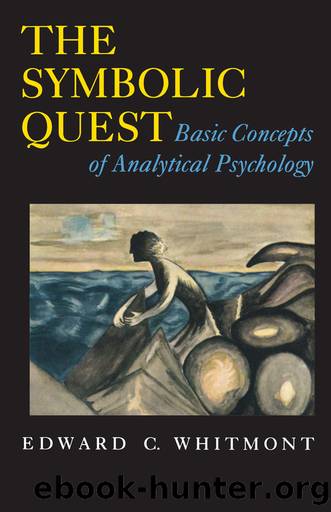The Symbolic Quest by Edward C. Whitmont

Author:Edward C. Whitmont
Language: eng
Format: epub
Publisher: Princeton University Press
Published: 2020-10-15T00:00:00+00:00
12. The Anima
IN JUNGâS ORIGINAL FORMULATION, anima and animus are the archetypes of what for either sex is the totally other. Each represents a world that is at first quite incomprehensible to its opposite, a world that can never be directly known. Even though we carry within us elements of the opposite sex, their field of expression is precisely that area which is most obscure, strange, irrational and fear-inspiring to us; it can at best be intuited and âfelt outâ but never completely understood. These archetypes, then, are predominantly contrasexual, expressing the fact that there is nothing so totally âotherâ as the opposite sex (see also afterword, p. 316ff.).
By way of brief characterization, the animd represents the archetype of the manâs Yin, the feminine within him, and the animus represents the womanâs maleness, her Yang. Let us recall at this point that the shadow represents repressed unconscious personal characteristicsâthough it too has its transpersonal levelâwhile anima and animus personify the general human a priori unconscious instinct patterns upon which many of these personal characteristics are based.
Anima and animus tend to operate like partial or separate personalities made up of different composite patterns. In manâas each is a different individualâeach anima behaves like a different individual âotherâ personality with whom he is âstuckâ or to whom he is âmarried.â For the sake of individuation it is necessary for him to find out what this other personality is like, how it feels, thinks and tends to act. In a given situation one has to consider not only oneâs own reaction but also how the anima reacts, what she desires, likes or dislikes. Like a problematic partner, the anima has to be treated with attention and consideration but also with discipline and experimental interplay and challenge. This other personality can be disciplined only if we give her some means of expression and if we are also prepared to learn from her.
To clothe these concepts with some substance let us consider an actual case.
A young man who was desperate for love and union came for a consultation. He was looking for the woman who would fulfill him and live up to his ideals, would share his interests, be a home-maker, a comrade, wife and mother, who would also be artistic, inspiring, understanding and beautiful. He had not found such a woman. He had been infatuated with many different girls, but the closer he came to them the more his passion cooled. They annoyed him; he feared that he might drown or be overcome by their power or, as he put it, be sucked dry, or be fenced in by them; they were too demanding, too disappointing; thus his great love always vanished, only to be kindled by another one. He was restless and somewhat unreliable, although ambitious and with a brilliant mind. He had perhaps some writing talentâat any rate he had written some poetryâbut for lack of discipline never produced anything substantial. He was snowed under by trifles and, restively impatient, always running after the next new project that beckoned around the corner.
Download
This site does not store any files on its server. We only index and link to content provided by other sites. Please contact the content providers to delete copyright contents if any and email us, we'll remove relevant links or contents immediately.
The Art of Thinking Clearly by Rolf Dobelli(10407)
Mindhunter: Inside the FBI's Elite Serial Crime Unit by John E. Douglas & Mark Olshaker(9311)
Change Your Questions, Change Your Life by Marilee Adams(7732)
Nudge - Improving Decisions about Health, Wealth, and Happiness by Thaler Sunstein(7689)
Mastermind: How to Think Like Sherlock Holmes by Maria Konnikova(7312)
The Power of Now: A Guide to Spiritual Enlightenment by Eckhart Tolle(5741)
Men In Love by Nancy Friday(5225)
Altered Sensations by David Pantalony(5091)
Factfulness: Ten Reasons We're Wrong About the World – and Why Things Are Better Than You Think by Hans Rosling(4729)
The Confidence Code by Katty Kay(4242)
Thinking in Bets by Annie Duke(4213)
Man and His Symbols by Carl Gustav Jung(4119)
The Worm at the Core by Sheldon Solomon(3477)
Why Buddhism is True by Robert Wright(3441)
Liar's Poker by Michael Lewis(3436)
Three Women by Lisa Taddeo(3418)
The Inner Life of Animals by Peter Wohlleben(3302)
Descartes' Error by Antonio Damasio(3264)
How Music Works by David Byrne(3252)
